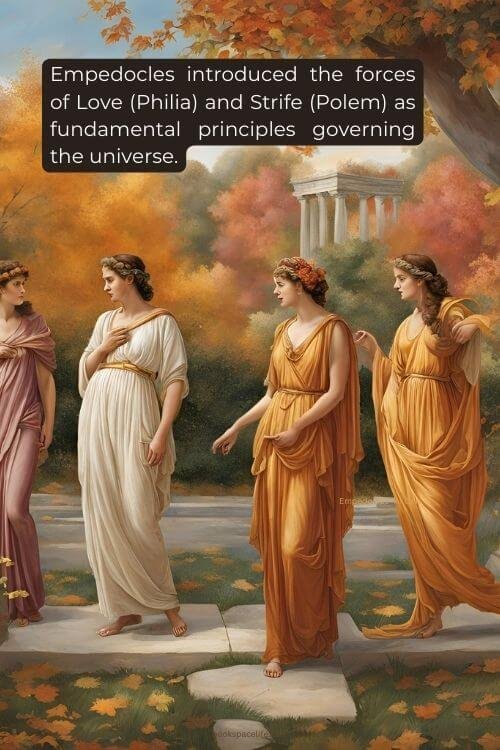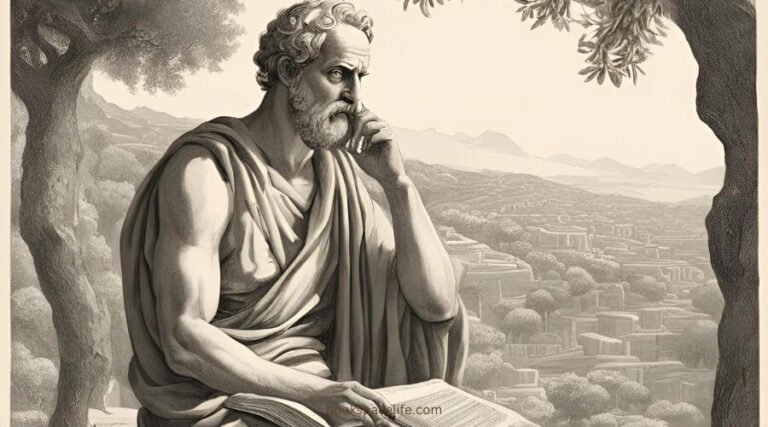Thales of Miletus
Empedocles: The Philosopher of Love, Strife, and the Four Elements
Empedocles (495 – 435 BCE) was a pre-Socratic philosopher from the ancient Greek city of Akragas (modern Agrigento) in Sicily.
He is best known for his unique blend of philosophy, science, and poetry, introducing the concept of the four classical elements (earth, air, fire, and water) as the fundamental building blocks of nature.
Empedocles’s ideas not only contributed significantly to the development of natural philosophy but also laid the groundwork for later scientific inquiry and philosophical thought.
This blog post will explore Empedocles’s life, travels, early education, philosophical contributions, and the lasting impact of his work.
Quick Read
Table of Contents
(1) Early Life and Education
Empedocles was born into a noble family around 495 BCE in Akragas (modern day Agrigento, Italy), a prosperous city-state known for its rich cultural and intellectual life.
The city was a melting pot of ideas and influences, which undoubtedly shaped his philosophical outlook.
Although the specifics of his early education are not well-documented, it is likely that Empedocles received a comprehensive education in various fields, including philosophy, mathematics, and the natural sciences.
Empedocles’s philosophical education may have been influenced by earlier thinkers such as Pythagoras, who emphasized the significance of numerical relationships and the harmony of the cosmos, and Heraclitus, who focused on the nature of change and the unity of opposites.
As he matured, Empedocles developed his distinct philosophical ideas, synthesizing various influences and creating a unique worldview.

(2) Travels and Philosophical Development
Empedocles traveled extensively throughout the Greek world, engaging with diverse cultures and ideas.
He is said to have visited cities such as Syracuse and Catania on the east coast of Sicily, as well as the Greek mainland.
These travels allowed him to broaden his intellectual horizons and expose himself to different philosophical traditions and scientific ideas.
His engagement with the community of Pythagoreans is particularly notable, as it influenced his thoughts on the nature of existence and the role of love and strife in the cosmos.
Empedocles’s travels also provided him with opportunities to observe various natural phenomena, further shaping his understanding of the world.
(3) Philosophical Contributions
- The Four Elements: Empedocles is best known for proposing that all matter is composed of four fundamental elements: earth, air, fire, and water.
He argued that these elements are the roots of all things, combining and separating under the influence of two opposing forces: love (or harmony) and strife (or discord).
This dualistic framework represents a significant departure from earlier pre-Socratic thinkers who sought a single underlying substance.
- Love and Strife: Central to Empedocles’s philosophy is the notion that love and strife are the primary forces that govern the cosmos.
Love, or Philia, is the force that unites and harmonizes the elements, while strife, or Neikos, is the force that separates and divides them.
Empedocles believed that all existence is a result of the interplay between these two forces, which create the cycle of life, death, and rebirth. This dynamic perspective on the universe highlights the importance of balance and harmony in nature.
- Cosmic Cycle: Empedocles introduced the idea of a cosmic cycle, where the elements continuously combine and separate, leading to the formation and dissolution of various entities.
He posited that this cycle occurs in a rhythm of harmony and conflict, with love and strife playing crucial roles in the process.
This cyclical view of existence influenced later philosophical discussions about the nature of reality and the interconnectedness of all things.
- Theory of Perception: Empedocles made significant contributions to the understanding of perception and the senses.
He proposed that our senses perceive the world through the interaction of elements, suggesting that objects emit tiny particles that interact with our senses.
This early attempt to explain perception laid the groundwork for later developments in psychology and the philosophy of mind.
- Poetic Style: Empedocles is notable for expressing his philosophical ideas through poetry, most famously in his works “On Nature” and “Purifications.”
His poetic style allowed him to convey complex ideas in a more accessible and engaging manner, merging scientific inquiry with artistic expression.
This blend of philosophy and poetry reflects the rich intellectual culture of ancient Greece and emphasizes the interconnectedness of knowledge and creativity.
- Religious and Ethical Dimensions: Empedocles’s philosophy also encompassed religious and ethical dimensions.
He believed in the transmigration of souls, asserting that the soul is immortal and undergoes a cycle of rebirth.
This belief influenced his ethical views, as he emphasized the importance of living a virtuous life in harmony with the cosmos.
His teachings encouraged individuals to seek balance and unity, reflecting the underlying themes of love and strife.

(4) Influence and Impact
Empedocles’s contributions to philosophy, science, and literature have had a lasting impact on subsequent thinkers and the development of Western thought:
- Influence on Later Philosophers: Empedocles’s ideas greatly influenced philosophers such as Plato and Aristotle.
Plato’s theory of forms reflects the search for a deeper understanding of the underlying reality, while Aristotle engaged with Empedocles’s concepts of the elements and the nature of change.
The interplay between love and strife resonated with later metaphysical inquiries, shaping discussions on unity, diversity, and the nature of existence.
- Foundation for Natural Philosophy: Empedocles’s formulation of the four elements provided a foundation for the development of natural philosophy.
His emphasis on the interplay of forces laid the groundwork for later scientific explorations of matter and energy.
The concept of elements as fundamental components of nature would later influence the development of modern chemistry and physics.
- Impact on Cosmology: Empedocles’s ideas about the cosmic cycle and the forces of love and strife contributed to the evolution of cosmological theories.
His vision of a universe governed by opposing forces foreshadowed later philosophical inquiries into the nature of existence, the cosmos, and the balance between order and chaos.
- Cultural Significance: Empedocles’s life and work reflect the rich intellectual culture of ancient Greece, characterized by a quest for knowledge and a willingness to challenge established beliefs.
His contributions represent a crucial moment in the transition from mythological explanations of the world to rational, systematic inquiries, setting the stage for the flourishing of philosophy in classical Greece.
- Legacy in Philosophy and Science: Empedocles’s legacy endures in the realms of philosophy and science, where his ideas continue to inspire contemporary discussions on the nature of existence, the interplay of forces in the cosmos, and the foundations of scientific inquiry.
His integration of philosophical thought with poetic expression invites modern readers to consider the complexities of reality and the interconnectedness of all things.
- Relevance to Environmental Philosophy: Empedocles’s emphasis on the balance of elements and the importance of harmony in nature has implications for contemporary environmental philosophy.
His ideas encourage a holistic understanding of the interconnectedness of life and the need for balance within ecosystems, highlighting the relevance of ancient thought to modern discussions about sustainability and ecological responsibility.
(5) Conclusion
Empedocles emerges as a central figure in the history of philosophy, whose innovative ideas about the four elements, love, and strife have left a lasting imprint on Western thought.
His synthesis of scientific inquiry and poetic expression reflects the richness of ancient Greek philosophy and the enduring quest for understanding the nature of existence.
Through his reflections on the interplay of forces in the cosmos, Empedocles challenged conventional beliefs and encouraged individuals to seek knowledge through a holistic understanding of the world.
His legacy endures in philosophical discussions, scientific exploration, and ethical considerations, reminding us of the interconnectedness of all things and the importance of balance and harmony in nature.
As we contemplate Empedocles’s life and teachings, we are invited to consider the complexities of existence and the cyclical nature of life.
His work serves as a testament to the power of philosophical inquiry and the importance of engaging critically with our beliefs, inspiring us to explore the mysteries of the universe and our place within it.
(A) 7 Quick Facts on Empedocles
- Born in Clazomenae – Anaxagoras was born around 500 BCE in Clazomenae, an ancient Greek city in Ionia (modern day Turkey)
- Moved to Athens – He relocated to Athens, where he became influential in philosophical and scientific discussions.
- Studied under Anaximenes – Anaxagoras was influenced by Anaximenes and other pre-Socratic philosophers in his early education.
- Introduced Nous – He proposed the concept of Nous (Mind or Intellect) as the organizing principle of the cosmos.
- Explained Celestial Phenomena – Anaxagoras provided natural explanations for solar and lunar eclipses, challenging mythological interpretations.
- Brought Philosophy to Athens – He is credited with introducing philosophy and scientific inquiry to Athenian society.
- Imprisoned for Atheism – Anaxagoras was imprisoned for impiety due to his teachings, particularly regarding the sun and celestial bodies.
(B) 10 Quotes attributed to Empedocles
- Everything is in everything. Suggesting that all substances contain the elements of everything else.
- Mind (nous) is the cause of all things. Proposing that a divine intellect orders and governs the universe.
- The sun is a fiery mass. Early assertion about the sun’s nature as a physical entity, rather than divine.
- The seeds of all things are in everything. Indicating that everything contains the potential for all things.
- From the infinite, all things come into being. Proposing that the infinite provides the material for all existence.
- The mind is the most divine of all things. Elevating the mind as the highest principle in understanding the cosmos.
- Light is the cause of vision. Acknowledging the role of light in the process of seeing.
- The heavens are not created by the gods, but by nature. Advocating for a naturalistic understanding of the cosmos.
- A mixture is better than a pure substance. Suggesting that combinations of elements create a more complex reality.
- The nature of things is not always apparent. Encouraging inquiry and deeper understanding of the underlying reality.








